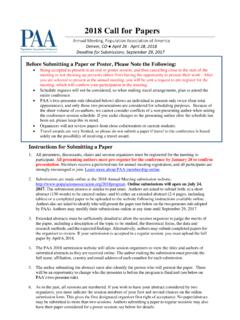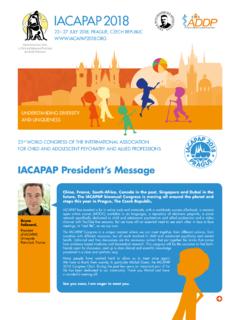Transcription of Call for Papers IAOS – OECD Conference “Better …
1 The Scientific Programme Committee of the 2018 Conference , jointly organised by the International association for Official Statistics (IAOS) and the Organisation for Economic Co-operation and Development (OECD) has selected the five themes below for the IAOS OECD Conference Better Statistics for Better Lives , to be held at the OECD Headquarters in Paris, September 19 21, 2018 . Under each of these themes, three sessions will be organised which can each accommodate three Papers .
2 You are invited to submit proposals for Papers for these themes. The web portal for submissions will be open effective October 6, 2017; The deadline for submissions is February 28, 2018 . If selected, the final Papers need to be submitted by August 31, 2018 . Theme 1: Sustainability Organisers: Lisa Bersales and Ronald Janssen The term sustainability or sustainable development was fully established during the UN Conference on Sustainable Development in 2012 in Rio de Janeiro.
3 That Conference is better known as Rio+20, and its outcome document is titled the Future we want . People are at the centre of sustainable development. In the Future we want , the promise was made to strive for a world that is just, equitable and inclusive, and the commitment was made to work together to promote sustained and inclusive economic growth, social development and environmental protection. To achieve a just balance among the economic, social and environmental needs of present and future generations, it is necessary to promote harmony with nature.
4 The natural and cultural diversity of the world was acknowledged, and it was recognized that all cultures and civilizations can contribute to sustainable development. The overarching objectives of sustainable development include promoting sustainable patterns of consumption and production, and protecting and managing the natural resource base of economic and social development. The Rio+20 Conference called for holistic and integrated approaches to sustainable development that will guide humanity to live in harmony with nature and lead to efforts to restore the health and integrity of the Earth s ecosystem.
5 Under this theme, Papers are welcome in thematic areas of sustainability or sustainable development , such as sustainable agriculture; sustainable consumption and production; sustainable energy; sustainable tourism; and sustainable cities and human settlements. call for Papers IAOS OECD Conference Better Statistics for Better Lives OECD Headquarters, Paris, September 19 21, 2018 Theme 2: Well-being and Quality of Life Organisers: Philomen Harrison and Enrique Ordaz Since the 2009 Stiglitz-Sen-Fitoussi Commission's report on the Measurement of Economic Performance and Social Progress, numerous initiatives have been presented to further develop conceptual and methodological frameworks for measuring the population s well-being.
6 They all agree that GDP, in particular per-capita GDP, is a metric that does not adequately capture all dimensions of a society s integral development, and therefore does not adequately reflect the state of broader measures of progress and well-being. The sole use of GDP per capita to measure the status a country may thus not lead to the achievement of sustainable economic welfare, social development and human well-being. Among these initiatives, the OECD s How is life?
7 Measuring Well-being , stands out as an integrated framework addressing the overall concept of well-being for measuring quality of life, material conditions and their sustainability over time, including its distribution across various groups of people. The objective of the sessions under this theme is to address the multidimensionality of well-being, and identify the main issues related to their measurement. Some of the main challenges may relate to the use of new data sources; and the application of new methodologies.
8 The topics to be considered are: measurement of subjective well-being; happiness and life satisfaction; measurement of quality of work and jobs and quality of life more generally; governance, security and drugs; regional and international differences in well-being; challenges in measuring the sustainability of well-being; Theme 3: The Future Role of Official Statistics Organisers: Cynthia Clark, Gary Dunnett and Jean-Pierre Le Gl au Official Statistics have a societal role in providing quality information as a public good.
9 Over the past decades, there has been an increase in desire for information and statistics that can be used as evidence for government policy development. These and other factors have increased the demand for information in many policy areas, categories and levels of geography. Official statistics are being forced to change, in order to meet the needs of a data infused society. Advances in technology have created an environment in which information and data are much more readily available.
10 The worldwide web also provides information on anything at a moments notice. Gathering information from individuals, enterprises and institutions via surveys has become more difficult to acquire, while administrative data becomes more readily available. National statistical institutions (NSIs) have the opportunity of developing procedures to use other organisations data (including administrative data and big data ) to reduce cost of collection and burden on the public.











